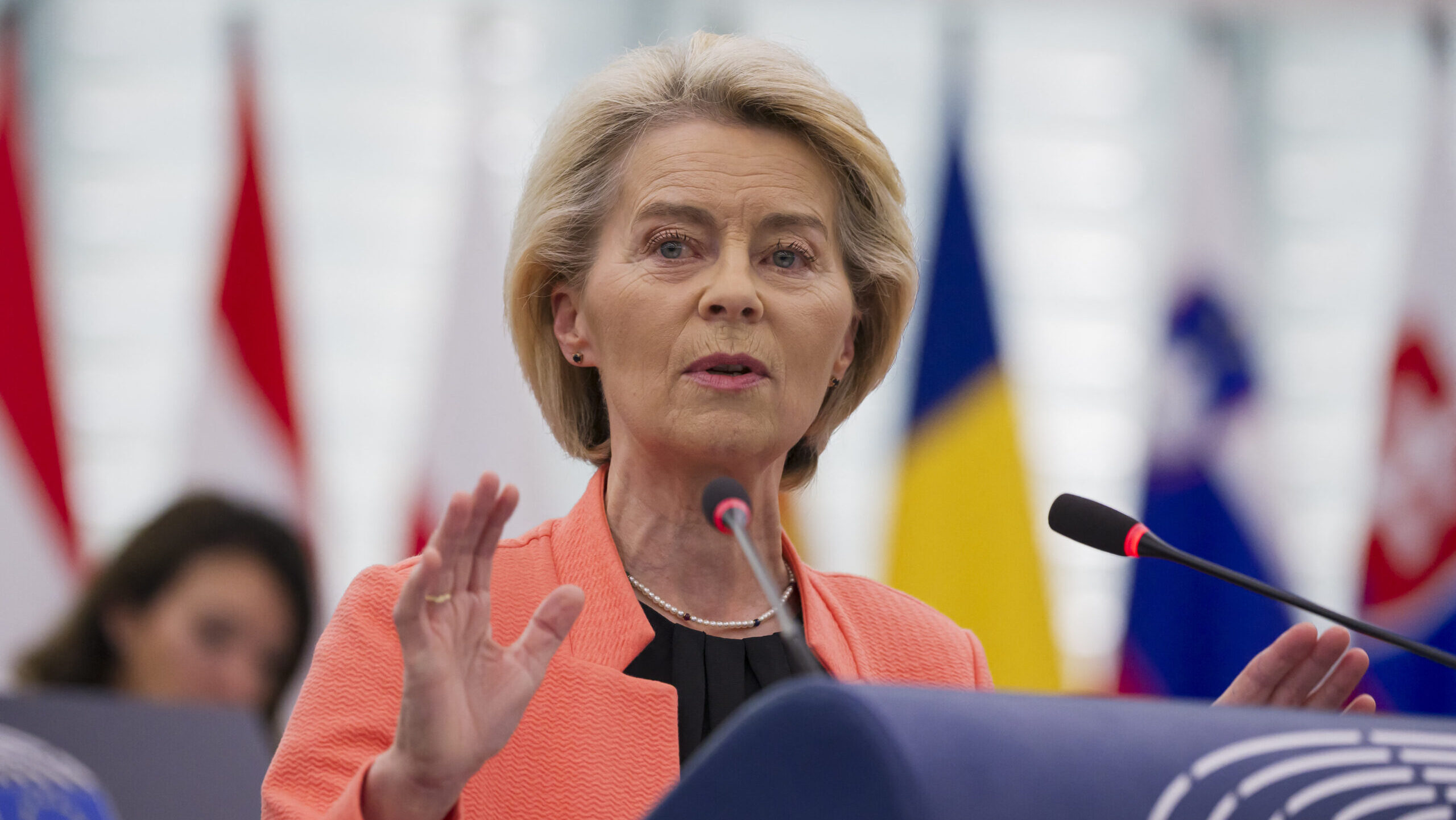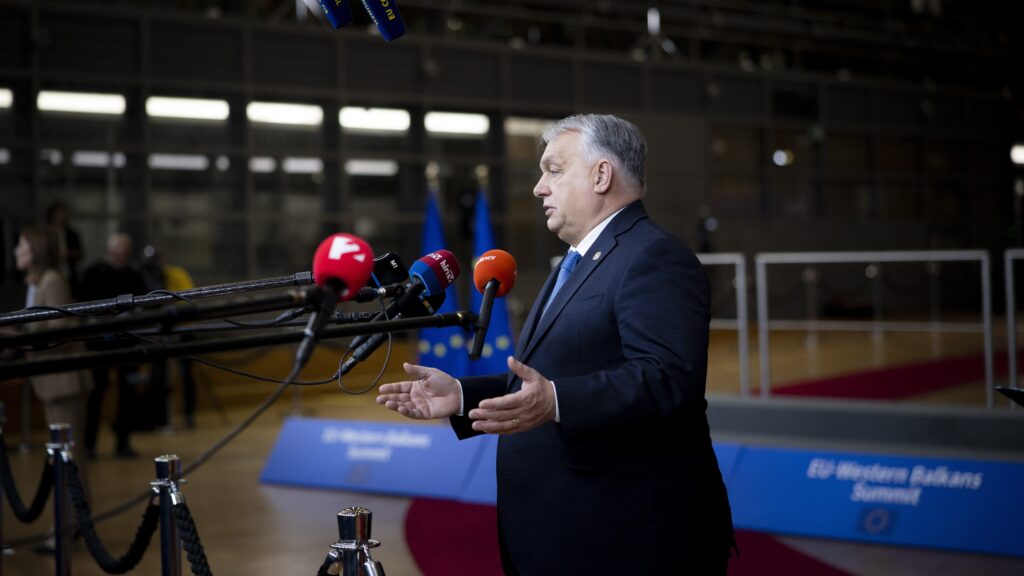The European Parliament held a highly unusual debate on Monday, 7 July—a debate on a motion of censure against the second Commission of President Ursula von der Leyen. The last time the EP conducted such a debate was more than a decade ago, in 2014, against former European Commission President Jean-Claude Juncker, which culminated in a no-confidence vote that ultimately fell short.
That appears likely to be the outcome this time as well, with the vote scheduled for Thursday, 10 July. However, despite mainstream parties likely lining up behind von der Leyen, Monday’s debate revealed widespread dissatisfaction with both von der Leyen herself and the Commission’s record, from voices on both the left and right of the European Parliament.
The motion was initiated by Romanian MEP Gheorghe Piperea, vice-president of the right-wing European Conservatives and Reformists (ECR) group, who cited concerns over the so-called ‘Pfizergate’—a scandal involving von der Leyen, Pfizer CEO Albert Bourla, and a series of secret text messages exchanged before the joint EU purchase of millions of Pfizer COVID-19 vaccines—as well as allegations of election interference and bypassing the EP in arranging joint loans for defence. The motion was co-signed by 77 MEPs from the ECR, Patriots for Europe (PfE), and Europe of Sovereign Nations (ESN). ‘This is the beginning of the end,’ Piperea declared in his opening speech, accusing von der Leyen’s decision-making of being ‘opaque’ and ‘discretionary’.
Putinist Conspiracy Theory
In her speech, von der Leyen deployed a familiar tactic used by EU leadership when faced with substantive criticism: she framed the entire motion as an attempt by ‘Putin apologists’ to bring her down. Similar sentiments were echoed by European People’s Party (EPP) leader Manfred Weber, who also made it clear to members of his faction that voting for von der Leyen on Thursday was mandatory. Von der Leyen dismissed ‘Pfizergate’ as a ‘conspiracy theory’ and ‘false claims’ driven by anti-EU forces seeking to divide democratic institutions.
Yet, this is demonstrably not the case with Pfizergate. As media reports have confirmed—including POLITICO Brussels, which is certainly not a source of Russian propaganda—the controversy is real. As POLITICO headlined recently: ‘Von der Leyen said “Pfizergate” was a conspiracy theory. It wasn’t.’
During the COVID-19 pandemic, the European Commission signed a €35 billion contract with Pfizer for the urgent delivery of 900 million BioNTech/Pfizer vaccine doses, with an option for another 900 million. As the pandemic has waned, much of this supply remains unused in warehouses, with the EU scrambling to renegotiate the contract’s terms—thus far with limited success.
Von der Leyen played an unusually prominent role in brokering the agreement, having exchanged a series of text messages with Bourla, as first reported by The New York Times in April 2021. In February 2023, the US outlet filed a lawsuit against the European Commission for refusing to release the contents of those messages. In May, the European Union’s General Court annulled the Commission’s decision not to disclose the texts, ruling that the Commission’s claim that it did not possess the messages lacked credibility.
All this makes it clear that von der Leyen’s accusations are merely attempts to evade responsibility in what could become one of the biggest corruption scandals in the EU’s history, implicating the Commission at its highest level. Vice-President of PfE Kinga Gál commented on the debate, stating that von der Leyen had ‘totally lost it’ and had ‘outdone her usual weak self.’ Gál added: ‘No matter how long the process is going to take, the beginning of the end of her era is already in sight.’
Kinga Gál on X (formerly Twitter): "The agony of @vonderleyen has demonstrably begun today. No matter how long the process is going to take, the beginning of the end of her era is already in sight. She totally lost it today & even outdid her usual weak self in the debate on the motion of censure against the... pic.twitter.com/ZOhHpGl743 / X"
The agony of @vonderleyen has demonstrably begun today. No matter how long the process is going to take, the beginning of the end of her era is already in sight. She totally lost it today & even outdid her usual weak self in the debate on the motion of censure against the...
Undemocratic Procedure
The structure of the debate itself has also drawn criticism for being undemocratic: each EP group was allowed a single speaker, with no opportunity to question von der Leyen after her remarks. ‘This is what accountability looks like—EU-style,’ Balázs Orbán, Political Director to the Hungarian Prime Minister, wrote on X following the debate. Orbán characterized the session as a ‘cover-up in real time’ rather than a genuine hearing.
The limited opportunity to challenge von der Leyen’s accountability is especially glaring when contrasted with the numerous debates held in recent years to scrutinize the state of Hungary’s democracy. This contrast is even more striking when compared to last year’s debate on Hungary’s EU Presidency programme, which devolved into mudslinging, led by von der Leyen herself in concert with mainstream and progressive factions aiming to discredit Hungarian Prime Minister Viktor Orbán through biased accusations.
Despite all this, most of the EP’s progressive and mainstream factions have pledged to vote against the censure to protect von der Leyen. Renew, the Greens, the EPP, and the Socialists and Democrats (S&D) have all rallied behind the Commission, denouncing the motion as a ‘far-right plot’. Yet these same groups did not shy away from harsh criticism of von der Leyen. Renew, the Greens, and the S&D all criticized the Commission president and the EPP for cooperating with right-wing factions in Parliament, especially on climate issues. ‘Don’t take pro-Europeans for granted—rein in the right flank so we can work together effectively,’ Renew leader Valérie Hayer warned von der Leyen.
To succeed, a vote of no-confidence would require a two-thirds majority of votes cast as well as a majority of all MEPs—meaning at least 361 of them voting against von der Leyen on Thursday. That outcome appears unlikely, as, in addition to mainstream and progressive factions, a significant portion of ECR MEPs will probably oppose the censure.
Related articles:







